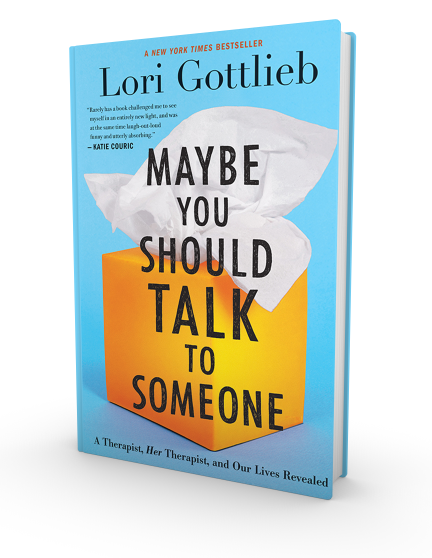Summary
Have you ever read a book from the point of view of a therapist? Or even more meta – a therapist who is going to therapy? In Lori Gottlieb’s novel, Maybe You Should Talk To Someone, she writes about her own experiences in therapy, both as a therapist and client. Whether it’s Julie coming to terms with her recent cancer diagnosis or John dealing with his high stress job in Hollywood, she discusses the stories behind her clients and even her own therapy sessions. During her therapy she discusses, her recent breakup and how blindsided she felt. What she discovers from her therapist, her patients, and her own experiences is that we are all trying “our best to get out of our own ways”. All everyone wants is to belong and be loved. Maybe You Should Talk to Someone brings a universal sense of community back to the human race.
Review
Therapy has a huge stigma surrounding it because people believe that it’s only for “crazy people” or that you need a life-altering event (i.e. someone passing away, getting a medical diagnosis, losing a job, etc) in order to justify needing it. However, therapy can be and should be available to anyone who wants it. The stigma surrounding mental health and therapy is a barrier for many people and this book helps break that down. By discussing therapy, it makes it more understandable to people. People don’t like concepts that they don’t understand. Gottlieb does a great job of making her patient’s stories relatable while also showing that therapy can be helpful for anyone, even rich and famous Hollywood producers like John. This book helps start the dialogue on the importance of mental health resources. I am overall a huge fan of both this book and going to therapy.
However, even great books can have great pitfalls. Maybe You Should Talk To Someone discusses the difficulty of going to therapy and breaks down stereotypes on certain client profiles but it never addresses racial inequalities when it comes to mental health resources. The author is a white cisgender woman. Therapy can be life-changing for many people, but that is usually only the people who have access to it. Marginalized communities have had a more difficult time accessing mental health resources and therapy whether it’s a financial, systemic or emotional hurdle. It would have been an important and interesting perspective to include a narrative about the intricacies of race and therapy.
Maybe You Should Talk To Someone gives an insider look into a therapist’s office and show that no matter who you are, a distraught client or a therapist themselves, we are all still human.


I agree 100% regarding marginalized communities lacking access to therapy. I also noticed a lack of a “feminist” lens in the book. By this I mean she missed opportunities to point out issues affecting women. One example is her discussion of office space pointing out her male therapist did not have his chair near a door which she referred to as an “escape” route in case a session escalated. It occurred to me her male therapist did not have to worry about escaping the way a female therapist would and I thought it would have been important for her to acknowledge this. Also – her choice of which clients to discuss with the reader… we suffer through several passages of a. narcissistic man when she had briefly introduced women Clients with (IMO) far more interesting stories. She also indulges in gender stereotyping which for 2021 is so played. In short, her book lacks a feminist awareness and that is unfortunate.
Thank you for commenting! I agree that she could have incorporated more of a feminist lens when it came to therapy and the clients she highlighted. If she writes another book I hope she has a more inclusive outlook!